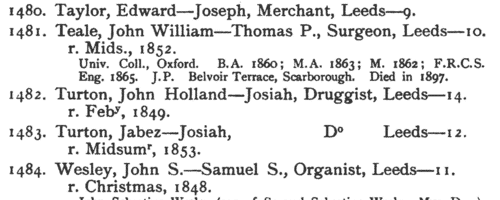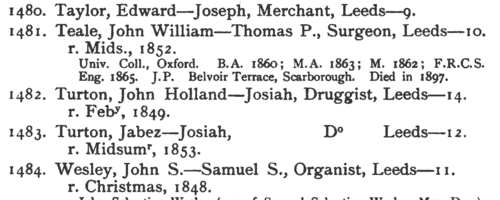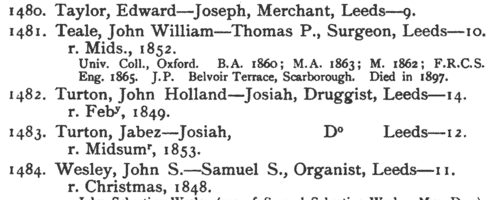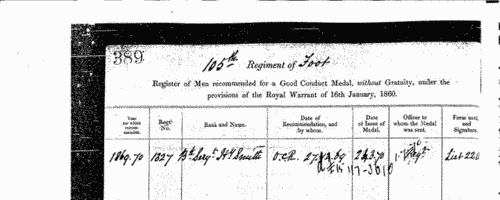Cariss Surname Ancestry ResultsOur indexes 1000-1999 include entries for the spelling 'cariss'. In the period you have requested, we have the following 47 records (displaying 21 to 30): Single Surname Subscription | | | Buying all 47 results of this search individually would cost £260.00. But you can have free access to all 47 records for a year, to view, to save and print, for £100. Save £160.00. More... |
These sample scans are from the original record. You will get scans of the full pages or articles where the surname you searched for has been found. Your web browser may prevent the sample windows from opening; in this case please change your browser settings to allow pop-up windows from this site. Petitioning Creditors and Solicitors
(1855)
Principal creditors petitioning to force a bankruptcy (but often close relatives of the bankrupt helping to protect his assets): and solicitors: in England and WalesCARISS. Cost: £6.00.  | Sample scan, click to enlarge

| Boys at Leeds Grammar School
(1856)
The admission books for Leeds Grammar School from 1820 to 1900 were edited by Edmund Wilson and published in 1906. The series of registers is almost complete for the period, there being in addition admission registers for the Lower (or Commercial) Department from 1856 to 1865, and lists of boys in the school in 1856, and in the Commercial Department in 1861. The entries are arranged by date or term of admission: a sequential number is given first, then surname, christian name, and, after a dash, father's christian name, occupation, and address; another dash, and then the age of the boy at admission, and often his year of leaving (with the abbreviation r. for 'removed' or 'left'). r.* means left without notice; (o) or S. or Stranger or Foreigner indicates a boy not on the foundation. The editor was unable to divine the meaning of the abbreviation (Q) or the asterisks prefixed to most entries in 1856 to 1860, but dutifully copies them into the text. In smaller type he then proceeds, where possible, to add some information about the boy's subsequent career.CARISS. Cost: £4.00.  | Sample scan, click to enlarge

| Petitioning Creditors and Solicitors
(1857)
Principal creditors petitioning to force a bankruptcy (but often close relatives of the bankrupt helping to protect his assets): and solicitorsCARISS. Cost: £6.00.  | Sample scan, click to enlarge

| Patentees of New Inventions
(1858)
Abstracts of British patents for new inventions applied for and granted from 1 January to 31 December 1858: giving date, name and address, and short description of the invention. It is then stated whether 'Letters patent sealed' or 'Provisional protection only'.CARISS. Cost: £6.00.  | Sample scan, click to enlarge

| Boys entering Leeds Grammar School: Upper (Classical) Department
(1864)
The admission books for Leeds Grammar School from 1820 to 1900 were edited by Edmund Wilson and published in 1906. The series of registers is almost complete for the period, there being in addition admission registers for the Lower (or Commercial) Department from 1856 to 1865, and lists of boys in the school in 1856, and in the Commercial Department in 1861. The entries are arranged by date or term of admission: a sequential number is given first, then surname, christian name, and, after a dash, father's christian name, occupation, and address; another dash, and then the age of the boy at admission, and often his year of leaving (with the abbreviation r. for 'removed' or 'left'). r.* means left without notice; (o) or S. or Stranger or Foreigner indicates a boy not on the foundation. The editor was unable to divine the meaning of the abbreviation (Q) or the asterisks prefixed to most entries in 1856 to 1860, but dutifully copies them into the text. In smaller type he then proceeds, where possible, to add some information about the boy's subsequent career.CARISS. Cost: £4.00.  | Sample scan, click to enlarge

| Patentees of New Inventions
(1867)
Abstracts of British patents for new inventions applied for and granted from 1 January to 31 December 1867: giving date, name and address, and short description of the invention. It is then stated whether 'Letters patent sealed' or 'Provisional protection only'.CARISS. Cost: £6.00.  | Sample scan, click to enlarge

| Boys entering Leeds Grammar School
(1869)
The admission books for Leeds Grammar School from 1820 to 1900 were edited by Edmund Wilson and published in 1906. The series of registers is almost complete for the period, there being in addition admission registers for the Lower (or Commercial) Department from 1856 to 1865, and lists of boys in the school in 1856, and in the Commercial Department in 1861. The entries are arranged by date or term of admission: a sequential number is given first, then surname, christian name, and, after a dash, father's christian name, occupation, and address; another dash, and then the age of the boy at admission, and often his year of leaving (with the abbreviation r. for 'removed' or 'left'). r.* means left without notice; (o) or S. or Stranger or Foreigner indicates a boy not on the foundation. The editor was unable to divine the meaning of the abbreviation (Q) or the asterisks prefixed to most entries in 1856 to 1860, but dutifully copies them into the text. In smaller type he then proceeds, where possible, to add some information about the boy's subsequent career.CARISS. Cost: £4.00.  | Sample scan, click to enlarge

|  Outstanding soldiers of the 14th regiment of Foot
(1860-1870) Outstanding soldiers of the 14th regiment of Foot
(1860-1870)
The 13th (The Buckinghamshire) Regiment of Foot was in two battalions. The 1st battalion embarked for Malta in 1854, and served successively in the Crimea and the Ionian Islands, being transferred from Corfu to the West Indies in 1860. The home depot was at Fermoy in Ireland. Having returned to England in 1862, the battalion was moved to Ireland in 1866, and to India in 1867. The second battalion was raised in Ireland in 1857; was at Mullingar in 1860; and was sent to New Zealand, taking part in the war of 1863 to 1865. In 1866 the battalion was moved to Australia and Tasmania, returning to England in 1870. Each year just a handful of outstanding soldiers of the regiment were chosen for good conduct medals and gratuities: these are listed here. There were two lists, one for men recommended for the Good Conduct Medal without a gratuity, and one for gratuities - £5 to a private, £10 to a corporal, and £15 to a serjeant. Both lists are indexed here, and each gives rank, name, regimental number, date of recommendation and date of issue. (The sample scan is from the 105th foot)CARISS. Cost: £8.00.  | Sample scan, click to enlarge

| Bankrupts, Assignees, Trustees and Solicitors
(1880)
Bankruptcy notices in England and Wales, January to March 1880CARISS. Cost: £6.00.  | Sample scan, click to enlarge

| Debtors, Insolvents and Bankrupts
(1880)
Bills of sale (binding assets to a creditor/lender), insolvencies and bankruptcies in England and Wales, April to June 1880CARISS. Cost: £6.00.  | Sample scan, click to enlarge

|
Research your ancestry, family history, genealogy and one-name study by direct access to original records and archives indexed by surname.
|













